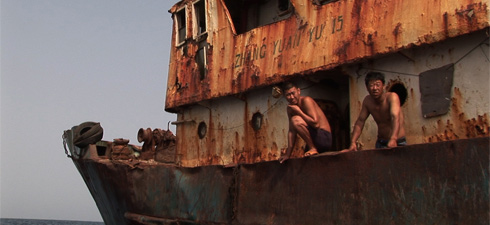When environmental campaigners began tracking a hi-tech South Korean trawler off the coast of West Africa, they were looking for proof of illegal fishing of dwindling African stocks. What they uncovered was an altogether different kind of travesty: human degradation so extreme it echoed the slavery they thought had been abolished more than a century ago.
"It was horrendous," said Duncan Copeland, a senior campaigner at the Environmental Justice Foundation, who boarded the South Korean-flagged trawler at the end of 2008 with naval forces from Sierra Leone.
"The men were working in the fish hold with no air or ventilation in temperatures of 40-45 degrees. It was rusty, greasy, hot and sweaty. There were cockroaches everywhere in the galleys and their food was in disgusting boxes. All they had for washing was a pump bringing up salt water. They stank. It was heartbreaking."
As their investigation continued, the EJF found vessel after vessel, some up to 40 years old, rusted and in terrible repair, engaged in pirate fishing – an illegal trade that damages already fragile marine stocks and exploits human labour in shocking conditions.
The 36 crew members on the boat boarded by Copeland came from China, Vietnam, Indonesia and Sierra Leone. Eight men shared a tiny windowless area of the fish hold with four cardboard "bunks" resting on planks. Four worked in the hold sorting and packing fish for the European market while four slept, and they would alternate, literally rolling out to allow the next to roll in. Read the full report in the Guardian...
Was this article useful? If so we are delighted!
It is freely available because we believe that the right to free and independent information is essential for democracy. But this right is not guaranteed forever, and independence comes at a cost. We need your support in order to continue publishing independent, multilingual news for all Europeans.
Discover our subscription offers and their exclusive benefits and become a member of our community now!












